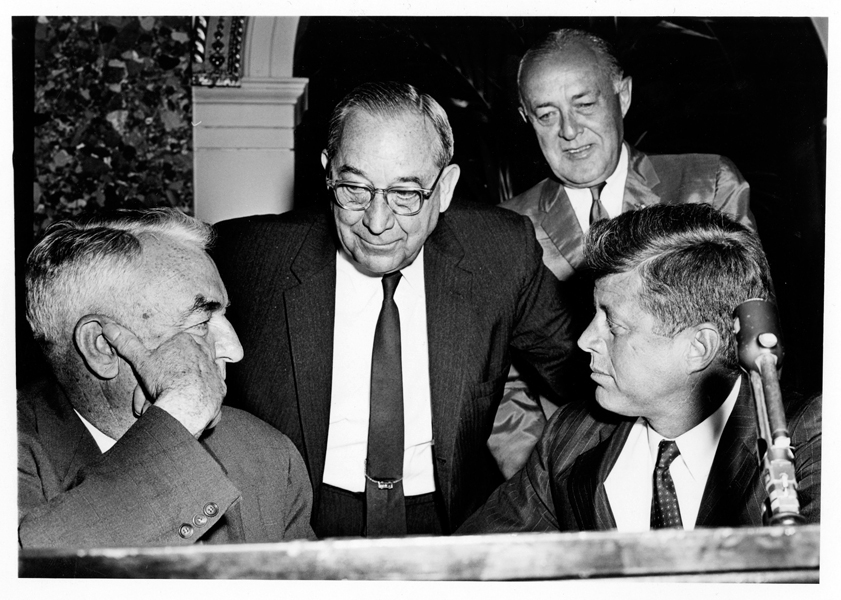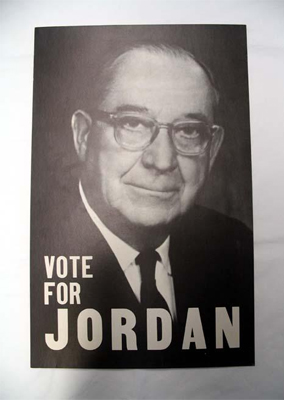Jordan, Benjamin Everett
8 Sept. 1896–15 Mar. 1974
See also: Charles Edward Jordan (from the Dictionary of North Carolina Biography)

Benjamin Everett Jordan, textile executive and U.S. senator, was born in Ramseur, the son of Ann Elizabeth Sellers and Henry Harrison Jordan, a Methodist minister. He attended Rutherford College Preparatory School and, in 1914–15, Trinity College (now Duke University). From 1915 to 1918 he worked in an uncle's jewelry store in Wellington, Kans. Jordan served in the U.S. Army Tank Corps in France in 1918 and with the occupation forces in Germany in 1919.
In 1920 he took a job with a textile mill in Gastonia, where he was plant superintendent of Myrtle Mill from 1923 to 1926 and of the Gray Mills from 1926 to 1927. In the latter year he was elected secretary-treasurer and general manager of the newly formed Sellers Manufacturing Company, organized by Jordan, his uncle Charles V. Sellers, a Burlington merchant, and other members of the Sellers family. The company purchased a textile mill on the Haw River at Saxapahaw which had been in receivership and standing idle for over three years. The plant was converted to the production of fine-combed cotton yarns intended to supply the local hosiery industry. By 1932 the corporation had purchased equipment for the production of mercerized combed yarns and silk yarn. As a result of plant improvements and the construction of a concrete dam in 1938, Sellers Manufacturing continued to grow. In the late thirties and forties the Sellers group purchased spinning mills in Cedar Falls, Burlington, and Wake Forest which were placed under Jordan's management. In the fifties the company added a dyeing process and equipment for the spinning and blending of synthetic fibers.
Jordan became active in the North Carolina Democratic party in the 1930s. In 1948 he and his brother, Henry, actively supported Kerr Scott's nomination for governor. After his election, Scott appointed Henry chairman of the North Carolina Highway Commission and Everett became chairman of the state Democratic party.
At the 1952 state Democratic convention, Jordan broke with Scott over the presidential nomination; Jordan supported Senator Richard Russell of Georgia, whereas Scott backed Adlai Stevenson. Scott resented Jordan's business alliance with Scott's political enemy, Senator Willis Smith, and Jordan's support of William B. Umstead's gubernatorial candidacy. Jordan continued as party chairman under Governor Umstead until his election as Democratic national committeeman in 1954—a post he held until his appointment to the Senate.
In April 1958 Governor Luther Hodges appointed Jordan to the U.S. Senate to fill the vacancy caused by the death of Kerr Scott, and in November Jordan was elected to fill the remainder of the term ending in January 1961. Several state newspapers suggested that Jordan was appointed as a "seat warmer" until Hodges could run for the Senate in 1960—although both Hodges and Jordan denied making a deal for Jordan not to seek reelection.
Jordan was elected to two full terms in the Senate in 1960 and 1966. His age and health were important issues in the 1972 Democratic primary in which he was defeated by Nick Galifianakis, who in turn lost the general election to Republican Jesse Helms.
By 1972 Jordan was fourth ranking Democrat on the Agriculture and Forestry Committee, third ranking Democrat on the Public Works Committee, and chairman of the Senate Rules Committee. He served alternately as chairman and vice-chairman of both the Joint Committee on the Library of Congress and the Joint Committee on Printing. Jordan was chairman of the Joint Committee on Inaugural Ceremonies in 1964–65 and 1968–69.
As a leader of the conservative wing of the state Democratic party, Jordan faithfully represented the state's tobacco and textile interests. He introduced the "acreage-poundage" legislation that brought sweeping changes in the tobacco marketing system and was instrumental in maintaining tobacco price supports. He also obtained federal appropriations for development of the state's water resources, harbor improvements, and an environmental health center in the Research Triangle Park. In 1964, he entered the national spotlight as chairman of the Rules Committee which investigated the activities of former Senate Democratic secretary Bobby Baker. Jordan's voting record was increasingly liberal during his tenure in the Senate. He generally supported the social welfare, educational, agricultural, and taxation programs of the Kennedy and Johnson administrations while opposing civil rights measures. He was regarded as a dove on the issue of the Vietnam War. In 1970 he broke ranks with other southern Democrats to vote in favor of the Cooper-Church amendment to the defense appropriations bill. The amendment passed, limiting the president's power to extend U.S. participation in the war. In 1971 he supported the McGovern-Hatfield end-the-war amendment.
Jordan's civic activities included service as a member of the North Carolina Peace Officers Benefit and Retirement Commission (1943–48) and of the North Carolina Medical Care Commission (1945–51). He was a member of the board of trustees of American University, Duke University, and Elon College; chairman of the board of trustees of Alamance County General Hospital; a director of the Alamance County chapter of the American Red Cross; an active supporter of the Cherokee Council of the Boy Scouts of America; and president and a director of the Alamance County Tuberculosis Association.
In 1924 Jordan married Katherine McLean, daughter of Robert Clyde McLean, a Gastonia cotton merchant and realtor. They had three children: Benjamin Everett, Rose Ann (m. Roger Gant, Jr.), and John McLean. Jordan died of cancer at his home in Saxapahaw, thirty-seven months after an operation for cancer of the colon. He was buried in Pine Hill Cemetery, Burlington.
References:
Biog. Dir. Am. Cong. (1970–71).
Clippings file (North Carolina Collection, University of North Carolina Library, Chapel Hill).
Nat. Cyc. Am. Biog. (1961–63).
William S. Powell, ed., North Carolina Lives (1962).
Who's Who in America (1970–71).
Who's Who in American Politics (1969–70).
Who's Who in the South and Southwest (1967–68).
James Richard Young, Textile Leaders of the South (1963).
Additional Resources:
"JFK with B. Everett Jordan, Harold Cooley, and Sam Ervin." Photograph. 1960-1963. North Carolina Politics, Politcs and Government, ECU Digital Collections. http://digital.lib.ecu.edu/3837 (accessed January 14, 2014).
Block, Herbert. ""Let 'em vote for congressmen - long as we can keep the congressmen from voting for them" / Herblock." Photograph. December 19, 1962. Prints and Photographs Division, Library of Congress. http://www.loc.gov/pictures/collection/hlb/item/2012647549/ (accessed January 14, 2014).
Guide to the Benjamin Everett Jordan Papers, 1896-1974. Rubenstein Library, Duke University. http://library.duke.edu/rubenstein/findingaids/jordan/ (accessed January 14, 2014).
Image Credits:
"JFK with B. Everett Jordan, Harold Cooley, and Sam Ervin." Photograph. 1960-1963. North Carolina Politics, Politcs and Government, ECU Digital Collections. http://digital.lib.ecu.edu/3837 (accessed January 14, 2014).
"[Vote for Jordan Poster], Accession #: H.2005.132.4." Poster. 1957. North Carolina Museum of History. (accessed January 14, 2014).
1 January 1988 | Troxler, George W.
